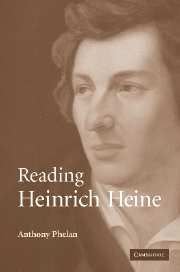Book contents
- Frontmatter
- Contents
- Acknowledgements
- Introduction
- PART I THE BIOGRAPHICAL IMPERATIVE
- PART II THE REAL HEINE
- 6 How to become a symbolist: Heine and the anthologies of Stefan George and Rudolf Borchardt
- 7 The real Heine: Atta Troll and allegory
- 8 Ventriloquism in Ludwig Börne. Eine Denkschrift
- PART III PARISIAN WRITING
- PART IV EPILOGUE
- Notes
- Bibliography
- Index
7 - The real Heine: Atta Troll and allegory
Published online by Cambridge University Press: 22 September 2009
- Frontmatter
- Contents
- Acknowledgements
- Introduction
- PART I THE BIOGRAPHICAL IMPERATIVE
- PART II THE REAL HEINE
- 6 How to become a symbolist: Heine and the anthologies of Stefan George and Rudolf Borchardt
- 7 The real Heine: Atta Troll and allegory
- 8 Ventriloquism in Ludwig Börne. Eine Denkschrift
- PART III PARISIAN WRITING
- PART IV EPILOGUE
- Notes
- Bibliography
- Index
Summary
Everything that's baroque, everything sloppy, the unashamedly prosaic character of these lines – is the very thing that is poetic.
(Alexander Jung)More than any other single text, Atta Troll is peculiarly representative of the tensions at work in the poetry gathered together as Heine's Neue Gedichte. The prologue of the Neuer Frühling sequence, which opens the collection, presents the poet dallying with amoretti and floral garlands while others must fight in the great struggle of the times (‘in dem großen Kampf der Zeit’, B 4, 298). Heine's constant assertion is that he has been ‘a brave soldier in humanity's war of emancipation’, as he claims in Die Reise von München nach Genoa, the first of the Italian Reisebilder. His second verse collection works through this recognition of the political, pulling between the revived lyricism of Neuer Frühling, the urban eroticism of the cycles on ‘sundry women’ (Verschiedene), and the political engagement of the ‘Zeitgedichte’, poems for the times. In different ways, all of these elements are present in the comprehensive range of Atta Troll. On the other hand, the sense of disruption in Heine's lyricism, which Borchardt identified in terms such as ‘fragment’ and ‘ruins’, is closely paralleled by Heine's own account of the genesis of his great comic poem. His difficulties with its form point to a serious struggle with changing styles and a fundamental engagement with political aesthetics.
AN INCOMPLETE PROJECT?
Atta Troll. Ein Sommernachtstraum was a long time in the making.
- Type
- Chapter
- Information
- Reading Heinrich Heine , pp. 129 - 150Publisher: Cambridge University PressPrint publication year: 2007



